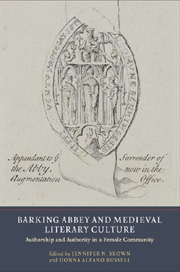Book contents
- Frontmatter
- Contents
- List of Contributors
- Acknowledgements
- List of Abbreviations
- Dedication
- Introduction: Barking's Lives, the Abbey and its Abbesses
- I BARKING ABBEY AND ITS ANGLO-SAXON CONTEXT
- II BARKING ABBEY AND ITS ANGLO-NORMAN CONTEXT
- III BARKING ABBEY AND THE LATER MIDDLE AGES
- 11 Keeping Body and Soul Together: The Charge to the Barking Cellaress
- 12 Rhythmic Liturgy, Embodiment and Female Authority in Barking's Easter Plays
- 13 Liturgy as the Site of Creative Engagement Contributions of the Nuns of Barking
- Afterword. Barking and the Historiography of Female Community
- Bibliography
- Index
- YORK MEDIEVAL PRESS: PUBLICATIONS
13 - Liturgy as the Site of Creative Engagement Contributions of the Nuns of Barking
from III - BARKING ABBEY AND THE LATER MIDDLE AGES
Published online by Cambridge University Press: 05 April 2013
- Frontmatter
- Contents
- List of Contributors
- Acknowledgements
- List of Abbreviations
- Dedication
- Introduction: Barking's Lives, the Abbey and its Abbesses
- I BARKING ABBEY AND ITS ANGLO-SAXON CONTEXT
- II BARKING ABBEY AND ITS ANGLO-NORMAN CONTEXT
- III BARKING ABBEY AND THE LATER MIDDLE AGES
- 11 Keeping Body and Soul Together: The Charge to the Barking Cellaress
- 12 Rhythmic Liturgy, Embodiment and Female Authority in Barking's Easter Plays
- 13 Liturgy as the Site of Creative Engagement Contributions of the Nuns of Barking
- Afterword. Barking and the Historiography of Female Community
- Bibliography
- Index
- YORK MEDIEVAL PRESS: PUBLICATIONS
Summary
The conference that engendered this chapter, ‘Authorship and Authority: Barking Abbey and its Texts’, seemed a rather unlikely place for a paper on medieval liturgy. The overwhelming majority of liturgical texts and musical settings are anonymous. As such, they are often distinguished from such other monastic genres as saint's lives, confessions, theological treatises and other works. Indeed the basic myth about medieval chant – that it was dictated to Pope Gregory by the Holy Spirit – worked against naming authors and composers. This repertoire gained much of its authority because of the assumption that it was divinely inspired and handed down orally from generation to generation. Even on the rare occasions when we do know the names of chant composers, credit for the work is given to God. Hildegard of Bingen, author and composer of more than seventy-five chants, described herself as a ‘feather on the breath of God’. So it is not surprising that we do not know the names of any nun from Barking Abbey who composed texts and/or music for the liturgy.
Claiming such authorship and authority is a pastime fraught with dangers for the contemporary scholar. The extant manuscripts provide only a very fragmentary view of the late-medieval liturgy. Some chants may appear to be unique when in fact they were sung at several other monasteries from which manuscripts do not survive.
- Type
- Chapter
- Information
- Barking Abbey and Medieval Literary CultureAuthorship and Authority in a Female Community, pp. 267 - 282Publisher: Boydell & BrewerPrint publication year: 2012



